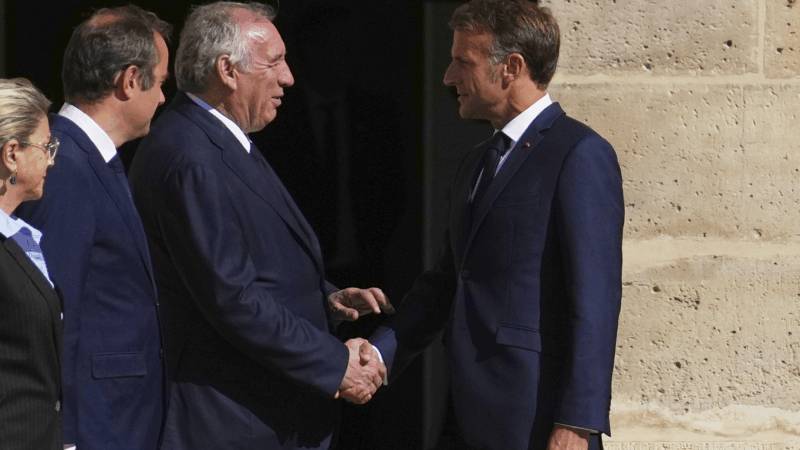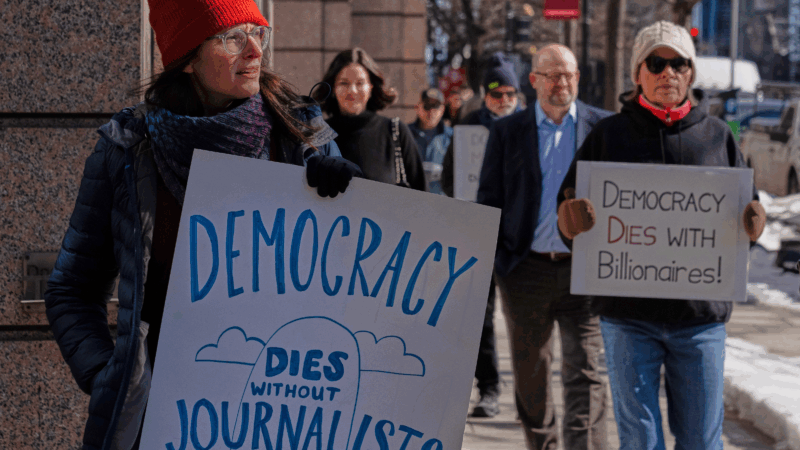After the latest government collapse, France struggles to find a way forward
PARIS — French Prime Minister François Bayrou presented his resignation to President Emmanuel Macron Tuesday morning, after lawmakers voted down his economic plans in a no-confidence ballot on Monday.
Before Monday’s vote, Bayrou said France’s big deficit and high debt levels made difficult economic decisions necessary, and urged members of Parliament to face the facts: “You have the power to topple the government, but you don’t have the power to erase reality,” he said.
He lost the vote 364 to 194 — a decisive defeat, and bigger than expected.
Political parties on the far left and far right celebrated Bayrou’s defeat and said a replacement should be chosen from their ranks. Jean-Luc Mélenchon, head of the France Unbowed party, called it a “victory for the people,” and an end to what he said were Macron’s “policies for the rich.”
Marine Le Pen, leader of the far-right National Rally, went further, calling for new early elections: “The new majority resulting from these elections must be able to draft a budget, so that our country has a budget.”
But that decision is up to Macron to take, and he has only said he will choose a new prime minister in the coming days. It’s expected he will choose someone who will pursue his business-friendly, centrist agenda.
It will be the fourth time he picks a new head of government in just a year and a half — and it won’t be easy, says French political journalist Thierry Arnaud.
“We’re going to enter a kind of a gray political area,” he says. “Macron’s task is to try to find somebody — a man or a woman — who will be able to negotiate their way through this very difficult parliament to find a majority. And it’s not obvious that he can succeed at that.”
Macron’s failed gamble
In June 2024, Macron dissolved the French Parliament after the National Rally captured a shocking 31.4% of the vote in elections for the European Parliament.
He was taking a gamble, calling for early national elections, clearly hoping the far-right breakthrough would frighten some voters into backing his own majority, so that he might govern more easily.
The gamble failed.
No party emerged with a majority. And now, even though the National Rally controls the biggest voting bloc, political scientist Corinne Mellul says there is little chance Macron would name someone from the far-right.
“It’s out of the question,” she says. “I would say it’s a point of honor. Because in both terms, he ran on a platform of keeping the National Rally at bay and doing whatever it takes. So appointing a prime minister from the party would be acknowledging that he failed.”
Mellul believes Macron has, in one sense, already failed, because the National Rally has never done better. It’s the most popular political party in France, with a third of polled voters regularly saying they would cast a ballot for it.
Arnaud says Macron’s options are limited, and with an approval rating of around 15%, he risks losing control of the situation.
“Under those circumstances it’s very difficult to be politically in charge of what happens next in the country,” he says.
So how did Macron, who is so active on the international stage, get here?
A problem of trust
Stéphane Rozès, a pollster who has worked for three French presidents, says Macron never built up enough political capital at home.
“He did not even bother to campaign in 2022,” he says, referring to the presidential election Macron won that year. “He ran on fear of the war in Ukraine and fear of the far right. He did not make a contract between himself and the French.”
Macron also pushed through most of his economic reforms without popular support, often passing measures using an emergency clause in the constitution instead of relying on a majority in parliament.
The progress he did make is now coming undone, says political analyst Nicole Bacharan.
“During his first term, Macron worked very hard at reforming our economy and social system and making it more efficient and in the second term he’s breaking everything,” she says.
There is talk that Macron could name a politician from the center-left, like Socialist parliamentarian Olivier Faure, who has said he is ready.
“The problem with him is that he’s never going to agree to a program that will seriously address the debt, unless it includes taxing the rich, and that is not going to get him a majority,” says Mellul.
In France’s fractured political environment, Mellul believes it will be hard for a premier from any party to get a majority to pass a budget. That spells disaster, says Douglas Webber, emeritus professor of political science at the international business school lNSEAD, south of Paris.
“Without a new budget and without some kind of measures to either raise taxes or to cut spending, the French government deficit will carry on growing. And France will come under a great deal of pressure on the bond markets and have to pay a higher interest rate on any kind of money that it borrows,” says Webber.
Far-left leader Mélenchon told French public TV on Monday that France did not have a debt problem. His far-left party says it would increase social spending and lower the retirement age.
The Bayrou government lasted just nine months. His predecessor, Michel Barnier, lasted 90 days.
As France awaits its next prime minister, Bacharan says many people are in despair over the uncertainty this has brought on the country.
“There is no trust in our politicians, no trust in our political system and no trust in the economy,” she says. And of course no trust in the president of the Republic.”
Transcript:
A MARTÍNEZ, HOST:
French Prime Minister Francois Bayrou will present his resignation to President Emmanuel Macron this morning. It comes after he lost a no-confidence vote in parliament last night. Now, naming a new prime minister is expected to be difficult for Macron as he lost his majority in parliament and is increasingly unpopular. NPR’s Eleanor Beardsley is following all of this from Paris. So, Eleanor, remind us why the prime minister lost the vote last night.
ELEANOR BEARDSLEY, BYLINE: Well, good morning. Yes, he lost because he wanted to cut $50 billion from the budget to address what he said is the most urgent problem facing France – its massive debt, one of the highest in the eurozone. He took his case to the French people over recent weeks, and he wanted the support of parliament, but he didn’t get it – far from it. About two-thirds of the parliament voted against his budget-cutting plans. The far left and right say this vote is the clear sign that Macron and his policies are finished. They say it’s time for the prime minister to come from their camp. But naming a prime minister from the far left or right is the last thing Macron wants to do. Here is French political journalist Thierry Arnaud describing what’s coming.
THIERRY ARNAUD: We are going to enter a – kind of a gray political area, one that is going to be very difficult. The task for him is to try and find somebody, man or woman, who will be able to negotiate their way through this very difficult parliament to find a majority there, and it’s not obvious that he can succeed at that.
MARTÍNEZ: So let’s just say Macron does name someone, either from the far right or the far left, as prime minister. What would that mean?
BEARDSLEY: Well, it would mean something in the French parliamentary system called cohabitation, where the president and the prime minister in government are from two different political parties. This is very rare, and it’s usually a difficult time where nothing gets done, and it limits the president’s power within France. I want you to listen to this politician, Jean-Luc Melenchon.
(SOUNDBITE OF ARCHIVED RECORDING)
JEAN-LUC MELENCHON: (Speaking French).
BEARDSLEY: OK. He’s head of the far-left France Unbowed Party. He was beaming last night. He calls the prime minister’s fall a victory for the people. He wants to be the next prime minister. He denies France even has a debt crisis and says he would increase social spending. The far right also has a prime minister candidate at the ready – 29-year-old acolyte of party head Marine Le Pen. His name is Jordan Bardella. He’s a TikTok star and a smooth talker. Even if he lacks experience, he’s popular with young people, especially young men.
MARTÍNEZ: All right. Now, we’ve seen President Macron taking a very prominent role internationally, but it sounds like that hasn’t helped him much in France.
BEARDSLEY: No, it hasn’t. You know, he’s long been seen as arrogant and disconnected from the lives of regular French people. His opponents call him the president of the rich. And when Macron for – ran for his second term in 2022, he didn’t even campaign. He said he was too busy with the world’s problems, which was the war in Ukraine at that time. So he’s really not built political capital at home. This could hurt what he’s actually achieved, says political analyst Nicole Bacharan.
NICOLE BACHARAN: During his first term, Macron worked very hard at reforming our economy and social system and making it more efficient. And in his second term, he’s breaking everything.
BEARDSLEY: She says everything Macron did in that first time – term is now being unraveled.
MARTÍNEZ: That’s NPR’s Eleanor Beardsley. Thanks a lot.
BEARDSLEY: You’re welcome.
Pentagon says it’s cutting ties with ‘woke’ Harvard, ending military training
Amid an ongoing standoff between Harvard and the White House, the Defense Department said it plans to cut ties with the Ivy League — ending military training, fellowships and certificate programs.
‘Washington Post’ CEO resigns after going AWOL during massive job cuts
Washington Post chief executive and publisher Will Lewis has resigned just days after the newspaper announced massive layoffs.
In this Icelandic drama, a couple quietly drifts apart
Icelandic director Hlynur Pálmason weaves scenes of quiet domestic life against the backdrop of an arresting landscape in his newest film.
After the Fall: How Olympic figure skaters soar after stumbling on the ice
Olympic figure skating is often seems to take athletes to the very edge of perfection, but even the greatest stumble and fall. How do they pull themselves together again on the biggest world stage? Toughness, poise and practice.
They’re cured of leprosy. Why do they still live in leprosy colonies?
Leprosy is one of the least contagious diseases around — and perhaps one of the most misunderstood. The colonies are relics of a not-too-distant past when those diagnosed with leprosy were exiled.
This season, ‘The Pitt’ is about what doesn’t happen in one day
The first season of The Pitt was about acute problems. The second is about chronic ones.







